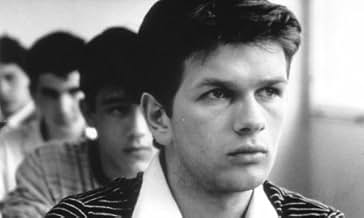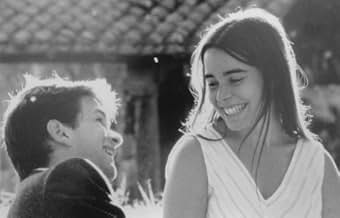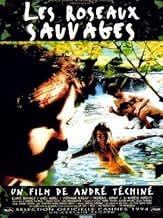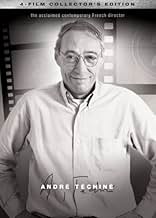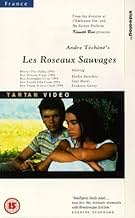Los destinos de dos parejas homosexuales están divididos.Los destinos de dos parejas homosexuales están divididos.Los destinos de dos parejas homosexuales están divididos.
- Premios
- 8 premios y 7 nominaciones en total
Argumento
¿Sabías que...?
- CuriosidadesThere are many references in the movie to "The O.A.S.," in conversation, and overheard on radio and television newscasts. OAS - or Organisation armée secrète, literally "Organization of the Secret Army" or "Secret Armed Organization," was a French nationalist terrorist organization during the Algerian War (1954-62), which ended in independence for Algeria in July 1962, which was not only the time setting for this movie, but the Algerian War was also the background conflict that propelled much of the plot of this film. Using armed struggle in an attempt to prevent Algeria's independence, OAS's motto was "Algeria is French and will remain so" (L'Algérie est française et le restera).
- PifiasOne of the songs featured at the party which Maïté and François go to after the movie is "Barbara Ann" by The Beach Boys, which was recorded and released in the fall of 1965, a full three years after the 1962 time setting for this movie.
- Citas
François Forestier: I'm like you, I'm queer, but I haven't met my soul-mate yet. I met someone who doesn't want me. I should give up. That would be smarter. But I'm not smart. I have no chance, but I can't give up. I don't get discouraged. We made love once. Just once. In the beginning. He doesn't want to anymore. Since then I'm like a thief. I steal brief moments... Once I held him tight on my bike. Another time, I slept near him. You have experience. Only you can help me. At my age, did this happen to you? When you liked a boy, what did you do? How did it work?
Monsieur Cassagne: Listen... It was so long ago... I don't want to disappoint you, but I've forgotten. I'm sorry. I have a client waiting. I have to go.
- Versiones alternativasShorter TV version released under the title Tous les garçons et les filles de leur âge: Le chêne et le roseau (1994) (TV)
- ConexionesFeatured in Cinéma, de notre temps: André Téchiné, après la Nouvelle Vague... (1993)
- Banda sonoraAdagio for Strings
by Samuel Barber
Everyone thinks 18-year-old high-schoolers Françoise (Morel) and Maïté (Bouchez) are an item, even Maïté, who is deeply influenced by her mother Madame Alvarez's (Moretti) communist slant, thinks so, they are so compatible and intimate together, although so far the relationship has been purely platonic, it is only a matter of time before it turns physical.
Françoise is a lean and feeble boy, from a petit bourgeois family, he cannot do sports (swimming is an exception) by virtue of his heart condition, he knows Maïté is his soul mate, but they can never be lovers, after he is sexually aroused by his rural classmate Serge (Rideau), son of a farmer with Italian lineage and whose elder brother would later fall in battle at the front line (after being unwillingly transported back to Algeria since Madame Alvarez refuses to offer a helping hand). A boarding school bromance is burgeoning, they become close friends and Françoise comes out to Maïté, she calmly accepts it with sincere encouragement, meanwhile for Serge, his tryout with Françoise is more or less out of a young boy's curiosity, in fact, he is more interested in Maïté, who abstains form his courtship in light of Françoise.
Thankfully, it is not a clichéd love triangle, instead it is a more dynamic quartet, the fourth force comes from Henri (Gorny), an Algerian-born French exile who is newly transferred to the class, he has lost his father in the war and becomes extremely cynical to the mainland bourgeois class (who is apathetic to the end of Algeria's colonization) and hostile to the radical leftists and communists (who are in favor of Algeria's independence). He is the alien, brings a radio in the class, picks on Serge and provokes Françoise for his sexuality, openly defies his teacher Madama Alvarez and reluctantly to accept the help from Monsieur Morelli (Nolot), until finally decides to drop out before the exam and by coincidence, meets Maïté in the communist headquarter in the still of the night, where her kindness thaws his malicious intention.
Eventually all four gather together for an excursion near the riverside with wild reeds waving around, as they let off their most honest and profound feelings, it is also a siren call to culminate the rite-of-passage of their blazing youth. The ultimate take of a 360 degree shot sterlingly singles out the lush atmosphere with a meaningful punchline, a lyrical rendition of the precious moments in one's adolescence, feeling love, experiencing heartbreak, accepting disappointment and facing an unknown future.
Téchiné magnificently teases out impressive and heartfelt performances from these four young actors, Morel, Bouchez and Gorny all rush into the top 10 tier of my yearly rank. Morel is unpolished but a pitch perfect choice for Françoise's sensitivity and integrity; Bouchez is a legitimate sensation, her Maïté, undergoes the choppiest emotional journey in the film, is utterly compelling in every frame; Gorny is detestable at first, then segues into a more sympathetic character thanks to his unfettering ire and the flitting touchiness for a wounded soul. Rideau's Serge, is offered less material to chew on apart from his jock virility, but his unaffected detachment denotes an alternative psyche in the society which hardly changes.
WILD REEDS is an intimately potent prose on how a controversial political situation can erode and alter the mindset of a young generation. Remarkably, it never begin to pall from its poetic aesthetics and robust narrative. It is deservingly a capstone in Téchiné's staunch career orbit.
- lasttimeisaw
- 1 oct 2014
- Enlace permanente
Selecciones populares
- How long is Wild Reeds?Con tecnología de Alexa
Detalles
Taquilla
- Recaudación en Estados Unidos y Canadá
- 807.775 US$
- Recaudación en todo el mundo
- 807.775 US$
Contribuir a esta página



